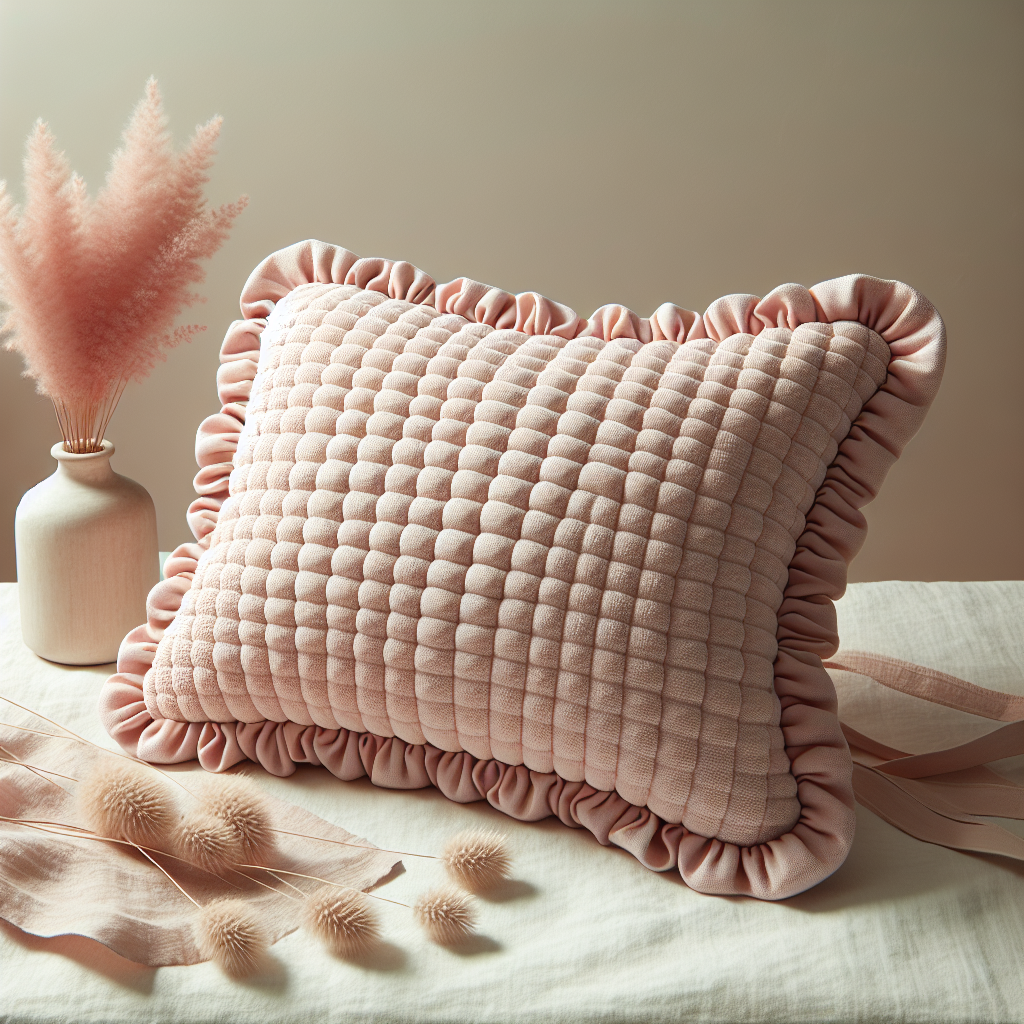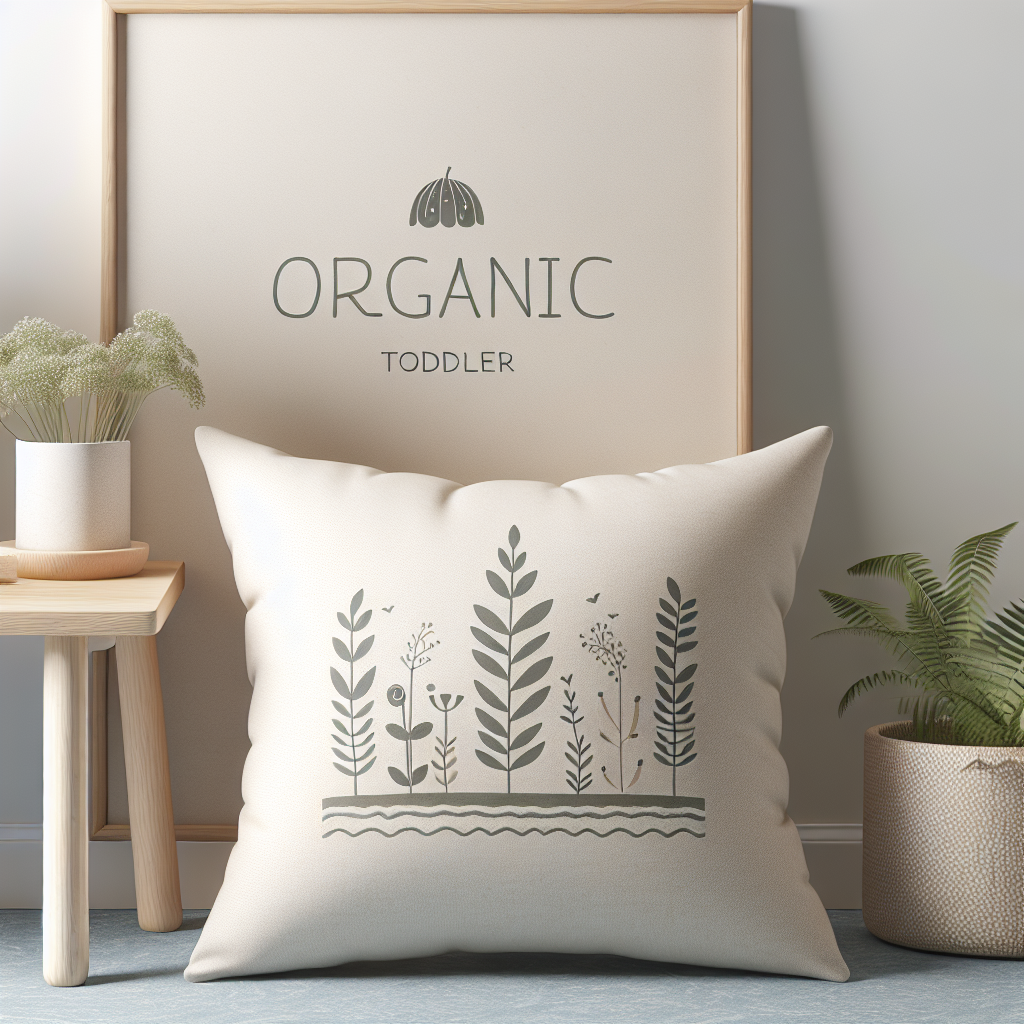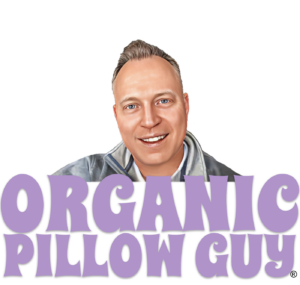
As parents, we constantly strive to provide the best for our children, which is why tour toddler needs an Organic Pillow for Better Sleep. One often overlooked aspect of a child’s health is the quality of sleep they receive.
The type of pillow your toddler uses can significantly impact not only their comfort but also their overall health. Enter the organic toddler pillow, a game-changer in the world of children’s bedding.
Unlike traditional pillows made from synthetic materials, organic pillows are crafted from 100% natural fibers such as organic cotton. This means your child won’t be breathing in toxic, odorless fumes that are commonly emitted by factory-made synthetic pillows. These harmful substances can have long-term effects on the respiratory system, making the switch to organic pillows not just a choice, but a necessity.
Organic pillows are hypoallergenic, meaning they are resistant to allergens such as dust mites, mold, and bacteria. This is particularly beneficial for toddlers who may be prone to allergies or respiratory issues. Additionally, organic cotton is breathable, ensuring that your toddler remains cool and comfortable throughout the night.
Experience the last 100% Organic Pillow from The Organic Pillow Guy! By investing in an organic toddler pillow, you are taking an essential step towards enhancing your child’s sleep quality and overall health.
Health Benefits of Organic Toddler Pillows
Choosing an organic toddler pillow goes beyond mere comfort; it’s a proactive step towards ensuring your child’s long-term health. Organic pillows offer a multitude of health benefits that can significantly impact your toddler’s well-being.
Firstly, organic pillows are free from harmful chemicals and synthetic materials. Traditional pillows often contain volatile organic compounds (VOCs), flame retardants, and other chemicals that can off-gas and be inhaled during sleep. These substances can lead to a variety of health issues, including respiratory problems, skin irritations, and even long-term developmental concerns. By opting for an organic pillow, you eliminate these risks and provide a safer sleeping environment for your child.
Moreover, organic toddler pillows are hypoallergenic. They are naturally resistant to common allergens such as dust mites, mold, and bacteria. This is particularly beneficial for toddlers who have sensitive skin or are prone to allergies. A hypoallergenic pillow can help reduce the incidence of allergic reactions, ensuring a more restful and uninterrupted sleep.
Another significant benefit is the enhanced breathability of organic materials. Organic cotton is highly breathable, which helps regulate your child’s body temperature throughout the night. This means less sweat and discomfort, contributing to deeper, more restorative sleep.
Additionally, organic pillows are often more durable than their synthetic counterparts. They maintain their shape and support over time, offering consistent comfort and reducing the need for frequent replacements. This durability also means fewer resources and waste, making it an environmentally friendly choice.
Comparing Organic vs Synthetic Pillows
 When it comes to choosing the right pillow for your toddler, understanding the differences between organic and synthetic pillows is essential. Both types offer distinct characteristics that can significantly impact your child’s sleep quality and overall health.
When it comes to choosing the right pillow for your toddler, understanding the differences between organic and synthetic pillows is essential. Both types offer distinct characteristics that can significantly impact your child’s sleep quality and overall health.
Material Composition: Organic pillows are made from natural materials such as organic cotton, wool, or latex. These materials are grown and processed without the use of harmful pesticides or chemicals. On the other hand, synthetic pillows are typically made from polyester, memory foam, or other man-made fibers, which often involve chemical treatments during production.
Health and Safety: One of the most compelling reasons to choose an organic toddler pillow is the absence of toxic chemicals. Synthetic pillows can emit volatile organic compounds (VOCs) and other harmful substances, which your child may inhale during sleep. These chemicals can cause respiratory issues, skin irritations, and even long-term health problems. Organic pillows, being free from such toxins, provide a safer sleeping environment.
Comfort and Support: Organic materials like cotton and wool offer excellent breathability, which helps regulate body temperature and reduces sweating. This is crucial for toddlers, who are more sensitive to temperature changes. Synthetic pillows, while often designed to mimic the softness of natural materials, can trap heat and lead to discomfort during the night.
Durability: Organic pillows are generally more durable and resilient compared to synthetic ones. Natural fibers retain their shape and support over time, whereas synthetic materials may flatten or become lumpy with use. This longevity means that an organic pillow can provide consistent comfort and support for a longer period.
Environmental Impact: Choosing an organic pillow is also a more sustainable option. Organic farming practices are designed to be eco-friendly, reducing the carbon footprint and promoting biodiversity. Conversely, the production of synthetic materials often involves significant environmental harm, including pollution and non-renewable resource consumption.
In summary, while synthetic pillows may offer affordability and a variety of options, the benefits of organic pillows in terms of health, comfort, durability, and environmental impact make them a superior choice for your toddler’s well-being.
Choosing the Right Organic Toddler Pillow
 Choosing the right organic toddler pillow is crucial for ensuring your little one enjoys restful and healthy sleep. There are several key factors to consider to make the best choice for your child’s needs.
Choosing the right organic toddler pillow is crucial for ensuring your little one enjoys restful and healthy sleep. There are several key factors to consider to make the best choice for your child’s needs.
Material: The material of the pillow is the first aspect to consider. Organic cotton is a popular choice due to its soft texture and breathability. Other excellent options include organic wool and latex, which offer natural resistance to dust mites and mold. Ensure that the materials are certified organic, as this guarantees they are free from harmful chemicals and pesticides.
Size and Thickness: Toddlers require pillows that are appropriately sized for their smaller frames. A pillow that is too thick or too large can lead to improper neck alignment and discomfort. Look for pillows specifically designed for toddlers, typically measuring around 12 x 16 inches and with a thickness that provides gentle support without elevating the head too much.
Firmness: The firmness of the pillow is another critical factor. A pillow that is too soft can pose a suffocation risk, while one that is too firm may be uncomfortable. Aim for a medium-firm pillow that provides adequate support while being soft enough for comfort. Remember, the goal is to maintain proper neck and spine alignment for your growing child.
Hypoallergenic Properties: Toddlers are particularly susceptible to allergies and respiratory issues. Choosing a pillow with hypoallergenic properties can help minimize exposure to allergens like dust mites, mold, and mildew. Organic wool and latex are naturally hypoallergenic, making them excellent choices for sensitive toddlers.
Washability: Kids can be messy, and having a pillow that is easy to clean is a significant advantage. Look for pillows with removable and washable covers. Some organic pillows are machine washable, which makes maintaining hygiene simpler and more convenient.
Certifications: Finally, ensure that the pillow has relevant certifications such as GOTS (Global Organic Textile Standard) or OEKO-TEX. These certifications indicate that the product meets strict organic and safety standards, giving you peace of mind about the quality and safety of the pillow.
By considering these factors, you can choose an organic toddler pillow that not only supports your child’s health and comfort but also aligns with your values of sustainability and safety. Investing in the right pillow can make a significant difference in your toddler’s sleep quality and overall well-being.
Caring for Your Organic Toddler Pillow
 Once you’ve selected the perfect organic toddler pillow, proper care is essential to maintain its benefits and longevity. Here are some tips on how to care for your organic pillow effectively:
Once you’ve selected the perfect organic toddler pillow, proper care is essential to maintain its benefits and longevity. Here are some tips on how to care for your organic pillow effectively:
Regular Airing: Organic materials thrive on fresh air. Regularly airing out the pillow will help keep it fresh and free of odors. Simply place it in a well-ventilated area, preferably in direct sunlight, for a few hours. This will naturally eliminate any moisture and prevent the buildup of mold and mildew.
Cleaning the Cover: Most organic toddler pillows come with a removable cover. Ensure that you wash the cover frequently, following the care instructions on the label. Typically, a gentle machine wash with mild detergent is sufficient. Avoid using harsh chemicals or bleach, as these can degrade the organic fibers.
Spot Cleaning: For minor spills or stains, spot cleaning is often enough. Use a damp cloth and a mild soap solution to gently blot the affected area. Be sure not to soak the pillow, as excessive moisture can damage the organic filling. Allow the pillow to dry completely before use.
Deep Cleaning: If the entire pillow needs cleaning, check if it is machine washable. Some organic pillows can be washed on a gentle cycle, but always follow the manufacturer’s instructions. For pillows that aren’t machine washable, consider professional cleaning services that specialize in natural and organic materials.
Fluffing: Over time, the pillow might lose its shape. Regular fluffing helps maintain its form and comfort. Simply give the pillow a good shake and knead it gently to redistribute the filling evenly. This will help retain its supportive properties.
Storage: If you need to store the pillow for an extended period, keep it in a breathable storage bag made from natural materials. Avoid plastic bags, as they can trap moisture and lead to mold growth. Store the pillow in a cool, dry place to preserve its integrity.
By following these care tips, you can ensure that your child’s organic toddler pillow remains clean, comfortable, and supportive. Proper maintenance not only extends the life of the pillow but also maintains its health benefits, providing your little one with a safe and restful sleep environment.
Where to Buy Organic Toddler Pillows
 When it comes to purchasing an organic toddler pillow, it’s crucial to choose a reputable source to ensure you receive a genuine and high-quality product. Here are some key places to consider:
When it comes to purchasing an organic toddler pillow, it’s crucial to choose a reputable source to ensure you receive a genuine and high-quality product. Here are some key places to consider:
Specialty Organic Stores: Many stores specialize in organic products, including bedding and pillows. These stores often have a curated selection of organic toddler pillows, ensuring that the products meet strict organic standards. Staff in these stores are usually knowledgeable and can provide valuable advice on choosing the best pillow for your child.
Online Retailers: Websites dedicated to organic living, such as The Organic Pillow Guy, offer a broad range of organic toddler pillows. Shopping online allows you to easily compare different brands and read customer reviews. Many online retailers also provide detailed product descriptions and certifications, giving you confidence in your purchase.
Farmers’ Markets: Local farmers’ markets are another excellent place to find organic products. Some vendors specialize in organic textiles and may offer handcrafted organic toddler pillows. Purchasing from a local vendor also supports small businesses and ensures that you know exactly where your product is coming from.
Eco-Friendly Boutiques: Boutiques that focus on eco-friendly and sustainable products often carry organic toddler pillows. These stores select products that align with their values, ensuring that the pillows are both environmentally friendly and safe for your child.
Direct from Manufacturers: Some manufacturers sell their products directly to consumers through their websites. This can be a great way to ensure you are getting an authentic product. Manufacturers often provide detailed information about the materials and processes used, so you can make an informed decision.
Remember, when buying an organic toddler pillow, it’s essential to verify the authenticity of the organic claims. Look for certifications such as GOTS (Global Organic Textile Standard) or USDA Organic to ensure that the pillow meets the highest standards of organic production.
Ready to make the switch? Experience the last 100% Organic Pillow from The Organic Pillow Guy!






No comment yet, add your voice below!